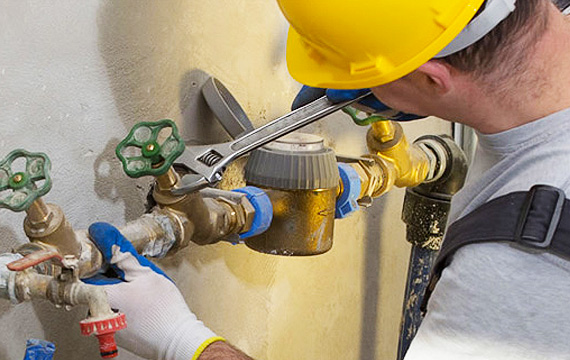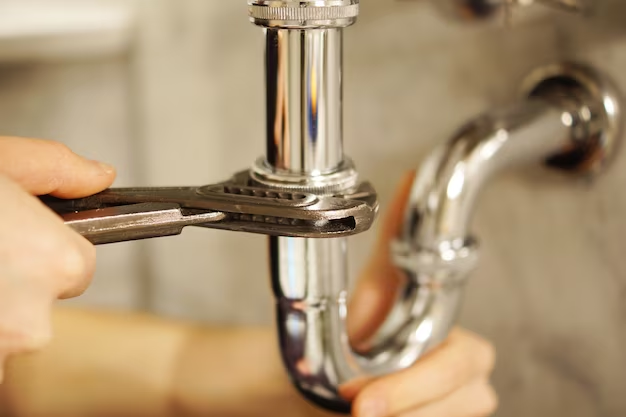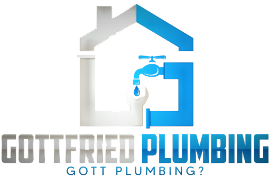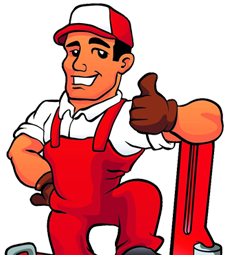Plumbing maintenance includes checking faucets, toilets, drains, outdoor plumbing, and pipes on a regular schedule. By following a consistent maintenance routine, you reduce plumbing issues, protect your home from water damage, and avoid costly repairs.
Many homeowners in Boerne only notice plumbing issues after visible damage appears, like water stains, cracked pipes, or sudden spikes in water bills. Hard water in the region also leads to buildup inside pipes, which slows down water flow and wears down plumbing fixtures. Regular inspections help catch these issues early, before they become expensive plumbing repairs.This maintenance guide explains the essential tasks you should handle daily, weekly, monthly, and seasonally. For professional plumbing service, call Gottfried Plumbing at 830-331-2055. Our plumbers serve Boerne, TX, and nearby areas.

Daily Plumbing Inspection
Check Faucets for Drips
Check faucets daily for small leaks, loose handles, or signs of mineral deposits before they cause damage.
Dripping faucets can waste gallons of water a day and increase your water bill. Look for puddles around the base, moisture near faucet connections, or mineral buildup on the spout. This usually means that the washer or cartridge needs to be replaced.
If you notice any of these, wipe the area dry and tighten the handle gently or shut off the valve under the sink until the faucet can be repaired.
Major Leaks
Leakages from pipes, fixtures, or valves can quickly turn into a flood.
Unlike a slow drip, these leaks release significant water in minutes. Common causes include failed shutoff valves, cracked pipes, or broken supply lines to bathroom and kitchen drains.
- Look for puddles on floors or spraying from connections.
- Use towels or buckets to contain water until help arrives.
Remember: Even if the leak slows down, it still requires emergency repairs.
Flush and Listen to Toilets
Make sure toilets flush fully and aren’t running between uses.
A toilet that keeps running usually has a worn flapper or a faulty fill valve. After flushing, the tank should refill and stop within seconds.
If you hear constant trickling or hissing, lift the tank lid and check the float and chain. If adjusting them doesn’t help, turn off the water at the shutoff valve and plan to replace the faulty part.
Look Under the Kitchen Sink
Check under the kitchen sink for moisture, stains, or signs of an active leak.
Open the cabinet and run the faucet for a few seconds. While the water is running, inspect the drainage pipe, supply lines, and shutoff valves for dampness, dripping water, and discoloration.
A slow drip often comes from a loose-fitting, worn-out gasket or cracked pipe. If the leak is steady, turn off the water using the shutoff valves and avoid using the sink until repairs are made
Scan for Water Around Fixtures
Look around the base of tubs, behind the toilet, under the washing machine, and near the dishwasher or water heater for undetected puddles and drips.
Spotting water early can help catch hidden leaks before they cause damage to floors and walls. If you notice damp spots, bubbling paint, or warped flooring, contact a nearby plumbing company for a thorough inspection.
Weekly Plumbing Maintenance Practices
Weekly plumbing maintenance includes checking drains, shutoff valves, outdoor plumbing, and exposed pipes for early signs of clogs, drips, or corrosion. Ignoring these practices can leave you with stuck valves, hidden leaks, and expensive drain repairs.
Inspect Drains for Slow Drainage
Run water in bathroom sinks, showers, and tubs to check for slow drainage or gurgling sounds.
Slow drainage often means a small clog is forming. Hair, soap scum, and grease are common causes of clogs in the drainage system. If you notice a delay or water backing up, flush the drain with hot water and a safe, enzyme-based cleaner.
Avoid harsh chemical drain cleaners as they can damage your pipes over time. If the clog persists, contact a Boerne plumber for drain cleaning service.
Test Shutoff Valves
Turn each shutoff valve slightly to make sure it still works and hasn’t seized.
Over time, shutoff valves under sinks and behind toilets can stiffen or stop turning. Give each valve a quarter turn and then return it to its original position. You will need to replace it if the valve doesn’t budge.
Check Outdoor Plumbing and Hose Bibs
Walk outside and check taps, hose bibs, and irrigation lines for leaks or cracks.
Run each outdoor spigot for a few seconds and look for drips or water collecting near the base. Tighten any loose connections and listen for whistling or vibrating sounds that might signal pressure issues. In warmer months, check that irrigation timers and heads are working properly.
Spot-Check Exposed Pipes
Visually inspect exposed piping in basements, garages, or utility closets for corrosion, dampness, or white mineral deposits.
Wipe down any questionable areas with a dry cloth and check again in a few hours. If moisture returns or corrosion worsens, schedule a plumbing inspection to prevent future pipe leaks or structural damage.

Monthly Home Plumbing Maintenance Checklist
A monthly plumbing maintenance checklist includes cleaning aerators, testing water pressure, flushing drains, and reviewing water bills for hidden leakages. Ignoring these steps can let mineral deposits, undetected leaks, and rising costs go unchecked until major plumbing issues develop.
Clean Faucet Aerators and Showerheads
Remove and clean aerators and showerheads to improve water flow.
Hard water in Boerne leaves mineral deposits that clog faucet screens and reduce functionality. Unscrew the aerators and soak them in vinegar to dissolve sediment. Rinse and reattach. For showerheads, use a toothbrush to scrub the nozzles.For localized issues like a sink or toilet, use the small fixture valves located under or behind the unit.
Check for Hidden Pipe Leaks
Walk through your home and inspect ceilings, walls, and floors for signs of hidden leaks.
Water stains, soft drywall, or peeling paint may indicate a slow leak behind the wall. Check the backs of cabinets and around appliances. If anything feels damp or looks warped, schedule a plumbing examination before the damage spreads.
Test Water Pressure and Flow
Run multiple fixtures to check for weak flow or inconsistent water pressure.
If only one fixture has poor pressure, clean the aerator. If several do, there could be pipe buildup or a partially closed valve. A licensed plumbing team should evaluate ongoing pressure issues.
Clean and Flush Drains
Flush drains in the kitchen, bathroom, and laundry room to prevent buildup and blockages using hot water, followed by a biodegradable drain cleaner.
This helps clear grease, hair, and soap before they harden into full clogs. Floor drains should be topped off with water to keep sewer gases from entering your home.
Review Water Bills for Spikes
Look for increases in water usage that don’t match your normal routine.
A higher water bill without increased usage may indicate a leak or running fixture. Compare your current usage to last month’s. If there’s a noticeable increase, check toilets, faucets, and hidden plumbing areas – or bring in a professional for a thorough review.
Annual Plumbing Maintenance Schedule and Inspections
Annual plumbing maintenance involves scheduling a professional inspection, flushing the water heater, checking sewer lines, and testing outdoor plumbing. Skipping these yearly tasks can leave you with corroded pipes, sewer backups, and costly emergency repairs.
Schedule a Whole-Home Plumbing Inspection
Have a licensed plumber inspect your entire plumbing system once a year.
A full plumbing inspection includes checking water pressure, pipe connections, valves, fixtures, and appliances. In Boerne homes, this also means checking for hard water residue and early corrosion in the plumbing system. The plumber may also use thermal imaging or moisture meters to spot hidden leaks before they cause structural damage.
Flush the Water Heater
Flush the water heater to remove the sediment buildup that reduces heating efficiency and shortens the unit’s lifespan.
Drain a few gallons from the bottom of the tank into a bucket to check for sand or debris. If water is cloudy or filled with sediment, flush the full tank. This step is especially important in Boerne due to mineral-heavy water. If you’re unsure how to flush the tank safely, have a plumber do it during their annual visit.
Inspect Sewer Lines and Cleanouts
Have a plumber inspect the main sewer line and cleanout for roots, scale accumulation, or obstructions.
Tree roots and scale buildup can block the water supply and cause sewage backups. A plumber will use a video camera to inspect the plumbing line. If needed, they can hydro-jet the sewer lines to remove blockages.
Inspect Outdoor Plumbing and Hose Bibs
Check outdoor faucets, hose bibs, irrigation lines, and exposed piping for leaks, cracks, or wear.
Run each spigot for a few seconds and look for drips, water pooling, or pressure issues such as whistling or vibrating sounds. Inspect connections for worn gaskets and tighten loose fittings. In colder months, confirm that pipe insulation is intact to protect against freezing. In warmer months, check irrigation timers and sprinkler heads for proper function. Replace damaged parts and repair cracks promptly to prevent costly water loss.
Seasonal Plumbing Maintenance Tips for Boerne Homes
Seasonal plumbing maintenance prepares your home for weather changes by protecting pipes in winter, checking for leaks in spring, maintaining irrigation in summer, and clearing the drainage system in fall. Skipping seasonal maintenance steps leads to frozen pipes, water damage, or unexpected plumbing emergencies
Winter Plumbing Maintenance
- Insulate exposed pipes in garages, crawl spaces, and exterior walls.
- Disconnect hoses and shut off outdoor faucets to prevent freezing.
- Test indoor shutoff valves to confirm they work.
- Let a slow trickle of water flow during extreme cold to protect pipes.
Spring Plumbing Maintenance Tasks
- Inspect outdoor taps, hose bibs, and irrigation lines for cracks or leaks.
- Look inside cabinets for water stains or dampness.
- Flush floor drains and fill traps with water.
- Clear gutters and yard drains to prepare for spring rains.
Summer Plumbing Practices
- Run sprinklers and check for uneven flow or broken heads.
- Inspect toilets and sinks for running water.
- Clean faucet aerators and showerheads to remove buildup.
- Schedule a plumbing inspection if you use a septic system.
Fall Plumbing Maintenance Plan
- Clear gutters, downspouts, and yard drainage system before heavy rains.
- Drain and store outdoor hoses; shut off outdoor supply valves.
- Inspect sewer lines or schedule drain cleaning for clogs.
- Call a local plumbing company to inspect piping, valves, and fixtures before winter.
Keep Your Plumbing System Protected With These Maintenance Tips
Plumbing maintenance is a routine that protects your home from costly plumbing issues, water damage, and rising bills.
By following this plumbing maintenance guide, you extend the life of your plumbing system and keep the water supply safe and reliable. If you discover leaks, low water flow, or other plumbing issues during your inspections, don’t wait until they become emergencies. Call 830-331-2055 for plumbing services in Boerne, TX. Our plumbers provide inspections, repairs, and maintenance plans tailored to your home’s needs.
FAQs
What should I do during plumbing emergencies in my home?
Turn off the main water supply immediately and call a licensed plumbing company to resolve the issue.
What plumbing components should be checked during routine maintenance?
Inspect visible piping, fixtures, shutoff valves, and water heaters regularly to prevent costly breakdowns.
Why are floor drains important in home plumbing systems?
Floor drains prevent flooding by directing water away from utility rooms, basements, or garages. Keep them clear of debris and refill the trap with water monthly to block sewer gases.
How often should plumbing connections be checked?
Check piping connections under sinks, bathroom fixtures, and near appliances every month. Loose or corroded connections are a common source of leakage.
When should I call a plumber instead of fixing a problem myself?
Call plumbers when you face major issues like recurring leakage, water pressure loss, or problems with the sewer line. A licensed professional has the tools to handle complex troubleshooting and ensures all work meets local plumbing codes.

